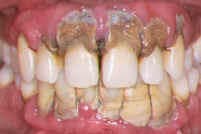Chronic bad breath is one of the top reasons why people seek dental care. Some people may find that no matter what they do or how often they brush their teeth they cannot get rid of their bad breath. While a majority of bad breath is due to germs that accumulate on the tongue, there are some underlying health problems that can cause bad breath. Without treating the underlying cause, no amount of brushing will help. Below are four health complications that can be causing your bad Breath:
1. Gum Disease: Severe gum disease results in the accumulation of bacteria in the gums. The  bacteria are what cause bad breadth. Your dentist may suggest certain procedures, like scaling, to remove the bacteria and the infected parts of the gums. Studies have shown that this can cure bad breath.
bacteria are what cause bad breadth. Your dentist may suggest certain procedures, like scaling, to remove the bacteria and the infected parts of the gums. Studies have shown that this can cure bad breath.
2. Sinus Infections: Some people are prone to chronic sinus infections, which can lead to the accumulation of bacteria and, in some instances, fungi in the paranasal sinuses. Bacteria, like Staphylococcus aureus, usually cause chronic sinus infections. As a result of the accumulation of bacteria in the sinuses, air with a pungent odor leaves the nostrils every time the affected individual breaths. To treat a sinus infection the doctor may prescribe an antibiotic. However this is only a temporary solution, in some instances nasal surgery may be needed.
3. Esophageal Web: Esophageal webs are outgrowths of the esophagus that protrude into the lumen of the esophagus, narrowing this long tube-like structure. Patients with this disorder find it hard to swallow solid foods due to the narrowing. Sometimes food may get stuck in the web and become putrid leading to an accumulation of bacteria and consequently, bad breath. No matter how much a person brushes and uses mouthwash they cannot get rid of their bad breath until the web goes away. Usually, treating patients with iron supplements causes the web to disappear. In some instances doctors may have to go in and remove it.
4. GERD: Gastro-esophageal Reflux Disease (acid reflux) is a fairly common disorder involving the lower esophageal sphincter between the stomach and the lower portion of the esophagus. Normally when a person eats, food goes from their mouth, thru their esophagus and into their stomach. When the food enters the stomach the LES closes behind it to prevent it from going back into the esophagus. In some individuals the sphincter is flimsy and does not close. This allows food and noxious gasses to go back wards into the esophagus. The smells from the partially digested food and acid can come up through the esophagus and into the mouth causing bad breath. The treatment for GERD usually includes lifestyle changes, including food modifications, and some prescription and/or over the counter medications.
Photo Credit: www.dentaldoc.info, www.dentalgentlecare.com, www.stanfordhospital.org










